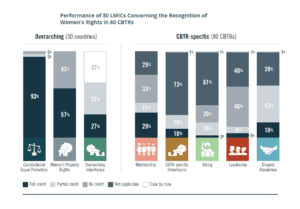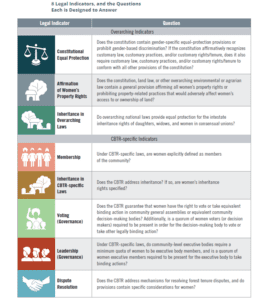Women’s Rights to Community Forests
First published in Power and Potential in 2017, this Database provides an unprecedented assessment of the status of developing countries’ legal frameworks regarding women’s rights to community lands, and whether states are meeting their obligations under national and international laws. Our recent update to the database, Resilience and Resistance provides a critical update to the 2017 study.
Our analysis builds on RRI’s “bundle of rights” assessment of the strength and content of Indigenous Peoples’, Afro-descendants’, and local communities’ legally recognized forest rights in order to identify and track the specific statutory rights of women within 80 community-based tenure regimes (CBTRs).
The methodology analyzes eight legal indicators essential for the protection of women’s forest tenure rights:

Resilience and Resistance concludes that despite some advancements in international law and national legislative reform processes, the community tenure rights of women remain widely unrecognized. National laws and regulations on these women’s rights to inheritance, community membership, community-level governance, and community-level dispute resolution are consistently unjust, falling far below the requirements of international law and related standards. The report provides actionable steps to encourage gender-transformative actions by governments and all other stakeholders who impact community forests and lands.
Visit RRI’s Tenure Tool to explore RRI’s Gender Data.

